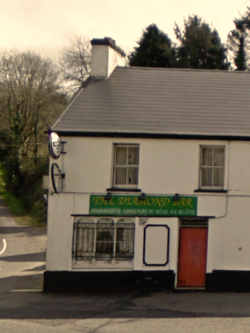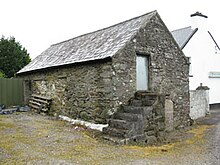The Diamond Bar: Difference between revisions
AFBorchert (talk | contribs) |
JJMC89 bot (talk | contribs) Migrate {{Infobox historic site}} coordinates parameters to {{Coord}}, see Wikipedia:Coordinates in infoboxes |
||
| Line 3: | Line 3: | ||
| location= [[Béal na Bláth]] |
| location= [[Béal na Bláth]] |
||
| type = Pub |
| type = Pub |
||
| coordinates = {{coord|51|49|18.4|N|8|51|20.0|W|display=inline,title}} |
|||
| lat_degrees = 51 |
|||
| lat_minutes = 49 |
|||
| lat_seconds = 18.4 |
|||
| lat_direction = N |
|||
| long_degrees = 8 |
|||
| long_minutes = 51 |
|||
| long_seconds = 20.0 |
|||
| long_direction = W |
|||
| owner = Eugene O'Callaghan |
| owner = Eugene O'Callaghan |
||
| built = 1840 |
| built = 1840 |
||
Revision as of 20:11, 8 January 2017
| The Diamond Bar | |
|---|---|
 Pub outside which Michael Collins' convoy stopped at the day of his assassination. | |
| Type | Pub |
| Location | Béal na Bláth |
| Coordinates | 51°49′18.4″N 8°51′20.0″W / 51.821778°N 8.855556°W |
| Built | 1840 |
| Owner | Eugene O'Callaghan |
| Website | thediamondbar.wordpress.com |

The Diamond Bar, formerly known as Long's Pub, is a historical site in Béal na Bláth in the townland of Glannarouge, County Cork. The ambush that led to the assassination of the Irish leader Michael Collins was planned in a storehouse behind the Diamond Bar. The Michael Collins Memorial, close to where Michael Collins was shot, is located one mile south of the Diamond Bar.
History
During the Irish Civil War, Michael Collins was on his way from Macroom to Bandon, County Cork on the morning of 22 August 1922. The travelling convoy included a Crossley tender, motorcyclist, armoured car and Michael Collins' staff car.[1] A meeting of Anti-Treaty Republicans had been scheduled for the same day in Murray's farmhouse,[2] behind the Diamond Bar, which is on the road to Bandon.[3]
A chauffeur was hired by Collins' convoy to show them an alternative route, as other roads were blocked due to bridges being destroyed. However, the convoy temporarily lost sight of the chauffeur's car, and as the convoy approached the five crossroads of Béal na Bláth, the convoy's scout leader asked Denny Long (known locally as Denny the Dane) for directions to Bandon.[4] Long recognised Michael Collins in the staff car, and informed Republican Tom Hales that Collins was in the convoy. Hales and others met in a building to the rear of the pub to plan and ambush in the event that Collins returned from Bandon via the same route. Though Éamon de Valera was at Long's Pub that day[5] and some sources suggest he dissuaded against the ambush,[6] plans were set into motion which resulted in the death of Michael Collins.[7]
Today
As of 2016, the Diamond Bar remains open. Some older exterior features are still visible, including the front bay-window and an iron ring attached to the front wall where horses would have been tied, which still as they were in 1922. The National Inventory of Architectural Heritage listing describes the building as a "detached three-bay two-storey house, built in 1840, with shopfront to front (north-west) elevation and single-storey extension to side (south-west) [..and..] timber sliding sash windows, attractive tripartite pubfront window opening and render detailing."[8] The Diamond Bar organises traditional Irish road bowling events and offers tours of the Collins' ambush site.[citation needed]
References
- ^ "The journey to West Cork". Collins 22 Society. Retrieved 2016-01-05.
- ^ "The Ambush". Collins 22 Society. Retrieved 2016-01-05.
- ^ Paul Donnelle (2012), Assassination!, ASIN B007B48OKQ
- ^ Cathal Liam (2006), Blood on the Shamrock: A Novel of Ireland's Civil War, ISBN 0970415524
- ^ "Éamon De Valera". Politico. Retrieved 2016-01-05.
- ^ James Mackay (1996), Michael Collins: A Life, ISBN 1851588574
- ^ Colm Connolly (1997), Michael Collins: Shadow of Bealnablath, ASIN 6302041252
- ^ "National Inventory of Architectural Heritage". National Inventory of Architectural Heritage. Retrieved 2016-01-05.
